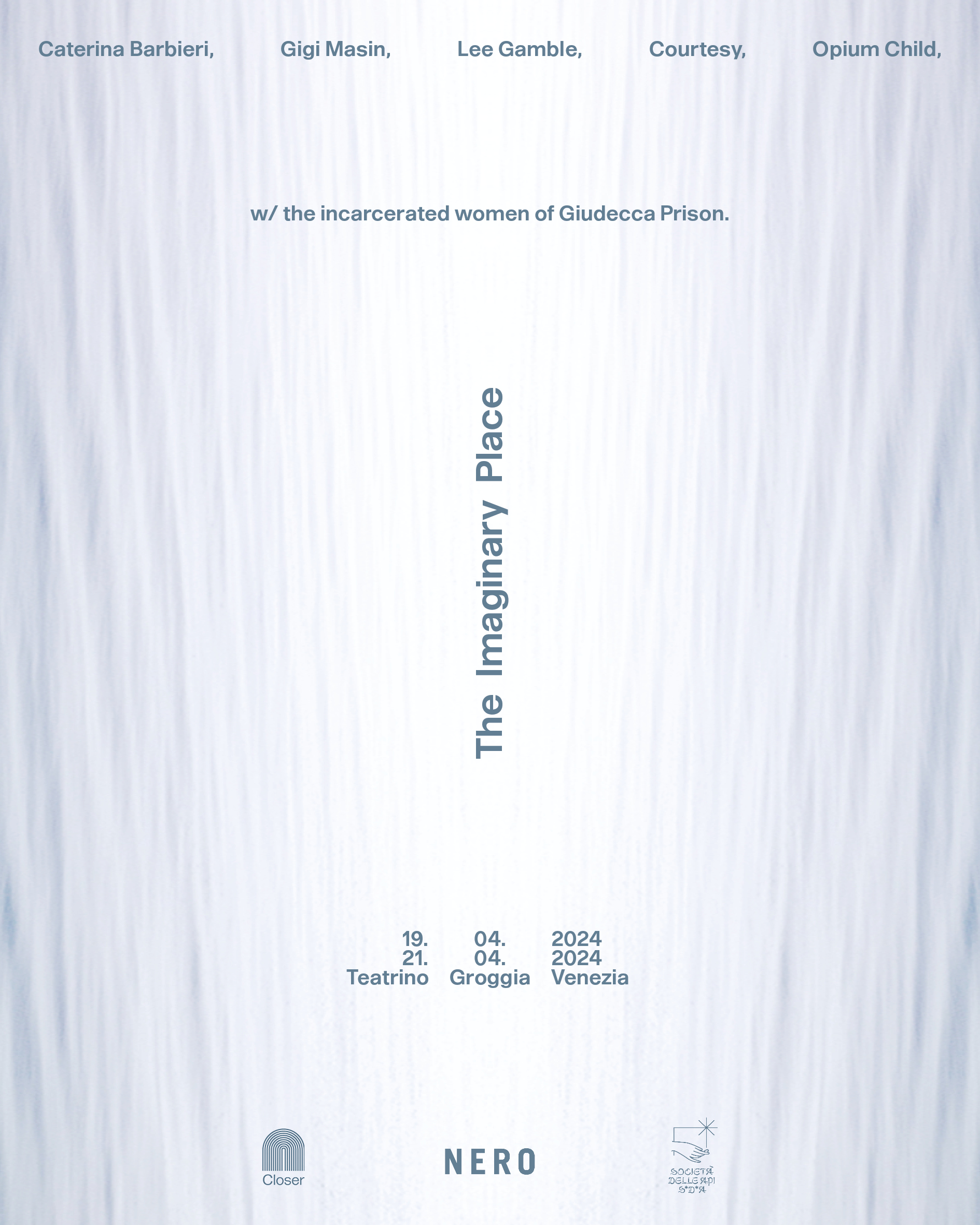
© NERO Editions
The Imaginary Place
Art support
April 19-21, 2024 – Teatrino Groggia Venezia
The Casa di Reclusione Femminile della Giudecca (Women’s Reclusion House of Giudecca) in Venice is located in an ancient monastery founded in the 12th century. Shortly after the 1600s, it became a shelter for “redeemed” prostitutes managed by nuns. The street where the main entrance is still located took its name from it: Calle delle Convertite (street of the redeemed). The Giudecca prison is exclusively for women; there is a special section for mothers, and almost all detainees work.
The Imaginary Place is the result of a listening and writing workshop carried out within the reclusion house: a circular movement between music and text, between the interior of the prison, the outside world, and the mental spaces evoked by the experience of sound. Inspired by listening to the sleeping mixes of five musicians—Caterina Barbieri, Gigi Masin, Courtesy, Lee Gamble, Opium Child—the incarcerated women have produced texts, fragments, stories, dreams, and memories born or imagined in a dreamlike dimension, then given to the musicians to create a new sonic object, at the same time narrative, personal and collective.
An installation preview of the project will take place during the opening week of the 60th Art Biennale, on April 19th, at 12:30, with a brunch prepared by “Libere Golosità”, a cooperative that deals with reintegration into prison labor in Vicenza, at 12:30 p.m. Friday, April 19, at Teatrino Groggia (Cannaregio, 3150).
The imaginary Place is a project curated by NERO and Closer, produced with the support of Società delle Api.

© NERO Editions
THE ARTISTS
Caterina Barbieri (Bologna, 1990) is an internationally renowned Italian composer and musician. Her main characteristic is to explore the psycho-physical effects of sound, stimulating memory and perception, and experimenting with the creative potential of computation through a minimalist language, aiming to reach states of alteration, ecstasy, and temporal hallucination.
Gigi Masin (Venice, 1955) is a crucial figure in experimental music. A self-taught Italian composer, he grew up in the landscape of free radios in the 1970s and later became a legendary figure in contemporary international ambient music. He has written music for theater and is also known as a member of the trio Gaussian Curve.
Najaaraq Vestbirk (1987), also known as Courtesy, is a Danish artist who lives between Copenhagen and Berlin. Her multidisciplinary practice stems from the dance floor, viewed as a starting point for investigating the organic and transcendent relationships between strangers. Spanning from installation to composition, DJ sets, and performance, as well as photography and video, under the pseudonym Courtesy, Vestbirk has embarked on numerous tours as a DJ, performing in prestigious venues and festivals worldwide, such as Berghain and Sónar.
Lee Gamble is a British artist, composer, and producer whose work inquires into themes of time, memory, hallucination, and simulation, blending electronic, noise, ambient, and dance music. Transitioning from early works in the field of noise composition and computer synthesis, he is widely known for his albums and EPs released on influential electronic music labels such as PAN and Hyperdub.
Opium Child is one of the specters haunting NERO, embodying the subharmonic murmur of the tentacular abyss. Temporarily materializing in the guise of Francesco de Figueiredo, its purpose is to plunge the listener into the mental circles of an abstract, lethargic, and dilated psychedelia.
THE CURATORS
NERO is an international publishing house dedicated to art, critical theory, and contemporary culture. It is also a creative studio exploring present and future imaginaries through ever-changing tools and formats. Specializing in art, music, philosophy, and visual cultures, NERO inquires about unconventional perspectives to decipher the core of a constantly evolving reality.
CLOSER is a cultural association born in Venice in 2016 to promote cultural activities in challenging places, wherever the social system shows its limitation, with a specific focus on the prison environment. CLOSER intervenes by organizing workshops and events to include those who have always been excluded; it carries out social projects for the citizenry, those who are less aware of being excluded. It is committed to spreading art for those who have always desired it and technology for those who have never had access to it: the power of learning is the only – true – power.